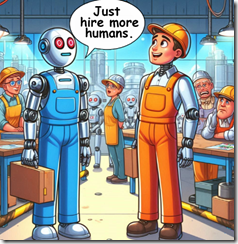AI Reduces Productivity: Quick Another Study Needed Now
July 29, 2024
 This essay is the work of a dinobaby. Unlike some folks, no smart software improved my native ineptness.
This essay is the work of a dinobaby. Unlike some folks, no smart software improved my native ineptness.
At lunch one of those at my table said with confidence that OpenAI was going to lose billions in 2024. Another person said, “Meta has published an open source AI manifesto.” I said, “Please, pass the pepper.”
The AI marketing and PR generators are facing a new problem. More information about AI is giving me a headache. I want to read about the next big thing delivering Ford F-150s filled with currency to my door. Enough of this Debbie Downer talk.
Then I spotted this article in Forbes Magazine, the capitalist tool. “77% Of Employees Report AI Has Increased Workloads And Hampered Productivity, Study Finds.”
The write up should bring tears of joy to those who thought they would be replaced by one of the tech giants smart software concoctions. Human employees hallucinate too. But humans have a couple of notable downsides. First, they require care and feeding, vacations, educational benefits and/or constant retraining, and continuous injections of cash. Second, they get old and walk out the door with expertise when they retire or just quit. And, third, they protest and sometimes litigate. That means additional costs and maybe a financial penalty to the employer. Smart software, on the other hand, does not impose those costs. The work is okay, particularly for intense knowledge work like writing meaningless content for search engine optimization or flipping through thousands of pages of documents looking for a particular name or a factoid of perceived importance.
But this capitalist tool write up says:
Despite 96% of C-suite executives expecting AI to boost productivity, the study reveals that, 77% of employees using AI say it has added to their workload and created challenges in achieving the expected productivity gains. Not only is AI increasing the workloads of full-time employees, it’s hampering productivity and contributing to employee burnout.
Interesting. An Upwork wizard Kelly Monahan is quoted to provide a bit of context I assume:
“In order to reap the full productivity value of AI, leaders need to create an AI-enhanced work model,” Monahan continues. “This includes leveraging alternative talent pools that are AI-ready, co-creating measures of productivity with their workforces, and developing a deep understanding of and proficiency in implementing a skills-based approach to hiring and talent development. Only then will leaders be able to avoid the risk of losing critical workers and advance their innovation agenda.”
The phrase “full productivity value” is fascinating. There’s a productivity payoff somewhere amidst the zeros and ones in the digital Augean Stable. There must be a pony in there?
What’s the fix? Well, it is not AI because the un-productive or intentionally non-productive human who must figure out how to make smart software pirouette can get trained up in AI and embrace any AI consultant who shows up to explain the ropes.
But the article is different from the hyperbolic excitement of those in the Red Alert world and the sweaty foreheads at AI pitch meetings. AI does not speed up. AI slows down. Slowing down means higher costs. AI is supposed to reduce costs. I am confused.
Net net: AI is coming productive or not. When someone perceives a technology will reduce costs, install that software. The outputs will be good enough. One hopes.
Stephen E Arnold, July 29, 2024



